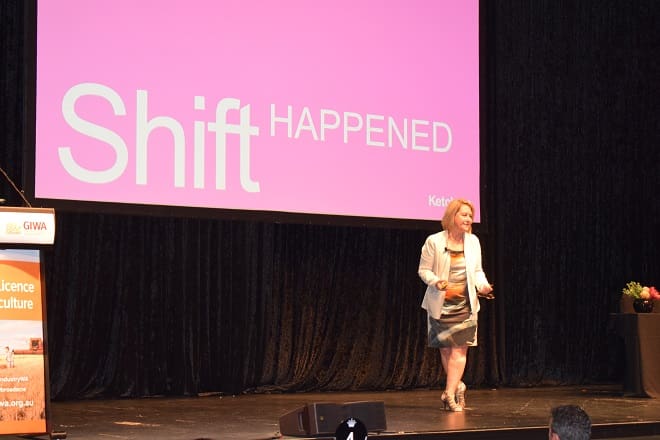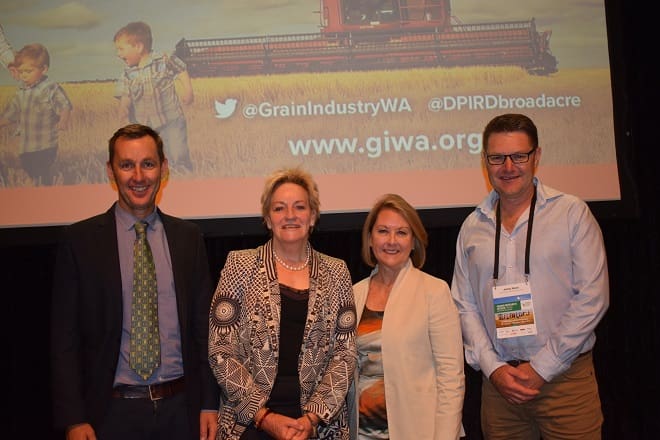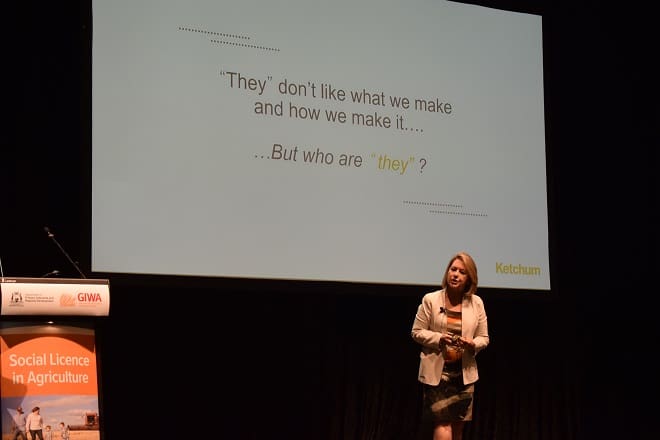WITH agriculture coming under increasing attack from a myriad of quarters, the industry has a sense of being under siege with its very social licence to operate under threat.
An ever-widening gap between the city and country has diluted the public’s understanding of farming, and the rise of social media has given a megaphone to anyone with an opinion on everything from agricultural chemicals to genetically modified foods.
Agriculture is on the back foot and grappling with how to respond.
Addressing the issue at the Grains Research and Development Corporation’s (GRDC) Research Update in Perth, Western Australia, Global Food and Beverage managing director, Linda Eatherton, Chicago, said it was time for agriculture to change its thinking, change the way it engaged with the consuming public and develop honest and open relationships with its customers.
This is an edited transcript of Ms Eatherton’s presentation to a breakfast put on by the Grain Industry Association of Western Australia (GIWA) at the GRDC Research Update in Perth, WA.
…………………………….
Decade of turmoil
We are in the decade of turmoil. Every time you turn around there is an attack. Suddenly everything we have done for decades, for centuries, is under fire, under scrutiny. Suddenly we are being painted as the bad guy.
Social media juggernaut
Do we fight it head on or turn our cheek and let it all play out? The truth is neither one of those approaches works. Both will backfire.
Why? Because there has been a fundamental social shift in the way in which people communicate, share and learn.
It’s social media. Social media has forever changed our businesses and industries.
Yet most organisations and industries fail to acknowledge the shift. Because they kept on working the way they had been working, there has been a huge clash.
So, “shift happened”. Society lost faith. Suddenly anything big became “bad” – big chemicals, big energy, big food, big agriculture.

Linda Eatherton: The shift has happened – social media has forever changed businesses and industries.
Who is driving the conversation?
There is a new, unique individual – the “food evangelist” – who doesn’t like what we make and how we make it. They are different to any personality we have ever seen before. They are changing our business landscape forever.
“Food evangelists” come from all walks of life, all economics factions and educational backgrounds. They are not a “crazy group of activists”, they are everyday people who have simply lost faith in everyone telling them something was true, only to find it turned out to be untrue.
They had a lot of questions about food – where it came from, where it was produced – but no-one was answering their questions in a real, honest way.
Their assumption was that when there is no information and no-one is talking in a singular voice you are trying to hide something.
The “food evangelists” now aggregate online, challenging the food industry.
There is a whole societal change in terms of who people are listening to and how they are getting their information. It is being done online.
What does it tell us?
There has been societal change in the way people think and act with regards to the food they eat.
The “food evangelists” are changing what food marketers are putting out at the retail level, and they are not going away.
They are asking food retailers and manufacturers to tell them everything they want to know about that product.
Children empowered
Children are the next generation of “food evangelists”. They are telling parents what to buy. They are declaring what they will and won’t eat.
These are children of the digital age who are empowered to tell the world what they want. We won’t undo that. They will be tomorrow’s consumers.
We need to embrace the “noise” as an early warning sign of how we will have communications and relationships, knowing this will be the consumer of the future.
Consumer emotions
Businesses were created to make profit. But businesses of today now serve at the pleasure of the people, profit is secondary.
We need to move away from “transactions” to “relationships” and embrace how people are thinking and feeling. It is an emotive issue. It isn’t based on fact or science, it is emotions.
In the past we could use marketing campaigns and advertising, but it doesn’t work that way anymore.
Today people require engagement, dialogue, conversation. We have to establish connections with people who don’t understand us.
Stakeholder unity
Everyone involved in agriculture is a stakeholder in the food industry. You are a brand. While you are all independent, to the public you are one brand called “food”. The public expects you to communicate with it and be aligned.
The public doesn’t see themselves as consumers, they see themselves as stakeholders in your business.
They want to know more. They don’t want us to hold the technology back from them and shield them from it because it is too complicated – which is the mistake we made with genetically-modified foods.
Don’t be afraid to talk about the technologies, but bring it forward in positive and interesting ways. You are the teachers of your industry. This will become the new job description for agriculturalists and it will require some new skills.
It means greater transparency. It does not mean more data, it means behaviours that show you are paying attention and sharing.
You have to use the technologies they are using to share the information.
Never-ending journey
You have to earn social licence. It is a journey that changes the way we do our work.
You have the opportunity to set the agenda and direct the conversation.
It is time to create a new food narrative that changes the conversation from “value” to “shared values”.
When the public knows you share the values they share, they know you are paying attention and are worth listening to.

GIWA chair, Bob Nixon, WA Minister for Agriculture, Alannah MacTiernan, Global Food and Beverage managing director, Linda Eatherton, and GIWA deputy chair, Ashley Wiese.
Grain Central: Get our free cropping news straight to your inbox – Click here


Comment via Grain Central Facebook page
I agree with these comments but the underlying issue with city people is that they have completely disassociated themselves with the circle of life. Growing up in the country you see and understand the circle of life from a very early age .I am 51 years young and I remember visiting a primary school in Adelaide .I was told by another child of similar age that they got their milk from a nice clean supermarket not a dirty old cow and their meat from a nice clean Butcher. People since then have become even more removed from how there food is actually produce . Australian farmers have some of the highest food safety standards in the world yet our city cousins have less understanding of food production than they did 45 years ago . Education would seem to best the best answer.